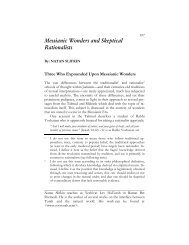Is There a Disconnect between Torah Learning and ... - Hakirah.org
Is There a Disconnect between Torah Learning and ... - Hakirah.org
Is There a Disconnect between Torah Learning and ... - Hakirah.org
You also want an ePaper? Increase the reach of your titles
YUMPU automatically turns print PDFs into web optimized ePapers that Google loves.
<strong>Is</strong> there a <strong>Disconnect</strong> <strong>between</strong> <strong>Torah</strong> <strong>Learning</strong> <strong>and</strong> <strong>Torah</strong> Living? : 39<br />
For example, when we hear that people in some cultures eat dog<br />
meat, our automatic reaction is that of disgust, even though there is<br />
no rational reason for differentiating <strong>between</strong> dog meat <strong>and</strong> the meat<br />
of any other mammal. Our reaction is intuitive, <strong>and</strong> based on our<br />
individual <strong>and</strong> cultural experiences.<br />
Haidt puts forth an intricate theory to explain how our<br />
experiences create such intuitive reactions. In essence it comes down<br />
to childhood experiences with moral episodes—individual, familial,<br />
<strong>and</strong> communal—that create memory traces (somatic “markers”) in<br />
the mind, which in the future, when similar episodes come up, give<br />
rise to the emotions experienced, i.e., to the kind of “gut feeling”<br />
reactions described above. Haidt argues that “Moral development is<br />
primarily a matter of the maturation <strong>and</strong> cultural shaping of<br />
endogenous intuitions. People can acquire explicit propositional<br />
knowledge about right <strong>and</strong> wrong in adulthood, but it is primarily<br />
through participation in custom complexes involving sensory, motor,<br />
<strong>and</strong> other forms of implicit knowledge shared with one's peers during<br />
the sensitive period of late childhood <strong>and</strong> adolescence that one<br />
comes to feel, physically <strong>and</strong> emotionally, the self-evident truth of<br />
moral propositions.”<br />
Similar ideas can also be found in Judaic sources. Thus, the<br />
Piaczesner Rebbe Reb Klonymous Kalman Shapira ztz”l writes about<br />
different levels of knowledge, the superficial <strong>and</strong> the profound, each<br />
affecting us differently 42 (my translation):<br />
<strong>There</strong> is knowledge that exists in a person’s mind in a dormant<br />
state, being accessible when needed, but not constantly affecting<br />
one’s thinking <strong>and</strong>/or behavior. <strong>There</strong> is a more salient <strong>and</strong> active<br />
kind of knowledge, whose presence influences, affects, colors, <strong>and</strong><br />
drives one’s thoughts all the time. As for example, an exciting new<br />
idea that one has just learned, or an insight that one has just had,<br />
which now causes him to interpret experiences <strong>and</strong> to see other<br />
ideas in its light… Certainly, a person’s knowledge of himself,<br />
which encompasses his whole being, influences all he knows, to the<br />
point that almost everything that he hears or sees is influenced by<br />
his self-knowledge <strong>and</strong> makes him think, “what good will this bring<br />
moral convictions have taken root <strong>and</strong> reside not in our intellects,<br />
where the argument takes place, but deeper in the intuitive realm of<br />
emotions <strong>and</strong> feelings, which is not reachable by intellectual debate.<br />
, "ה<br />
.<br />
ספר דרך המלך פרשת ויצא בהוצאת הרב אלימלך שפירא, תל אביב תשנ 42
















